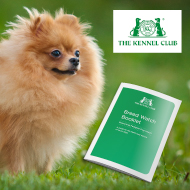Kennel Club expands Breed Watch System

German Spitz should be monitored for 'sore eyes or excessive tearing'.
The Kennel Club has announced that it is to expand its Breed Watch system to ensure more robust monitoring of new and emerging health and welfare concerns.
The move follows a recommendation by the Kennel Club’s Breed Standards & Conformation sub-group and approval from the Kennel Club Board. The Kennel Club Dog Health Group concluded that the below points of concern should be monitored and added to Breed Watch for the respective breeds:
Boston Terrier – ‘lack of tail, screw tail, inverted tail and tight tail’ and ‘irregular hind movement’. Reclassification from Category 1 to Category 2.
Boxer – ‘pinched nostrils’. Reclassification from Category 1 to Category 2.
Bullmastiff – ‘excessive amounts of loose facial skin with conformational defects of the upper and/or lower eyelids so that the eyelid margins are not in normal contact with the eye when the dog is in its natural pose e.g. they turn in, or out, or both abnormalities are present’. Reclassification from Category 1 to Category 2.
Cavalier King Charles Spaniel – ‘sore eyes or excessive tearing’, ‘unsound movement’ and ‘weak hindquarters’. Reclassification from Category 1 to Category 2.
Chihuahua – expansion of current dental point of concern to: ‘wry jaw’, ‘retained puppy teeth’, ‘misplaced teeth’, ‘protruding tongue as a result of incorrect teeth’, ‘missing teeth’, and ‘incorrect bites’. ‘Excessively short muzzles’ also to be added.
Chinese Crested – ‘nervous temperament’.
Dachshund – ‘sore eyes or excessive tearing’, ‘incorrect hindquarter movement/ unsound movement’ and amendment for the current point of ‘body weight/ condition’ to ‘significantly underweight’. Reclassification of Standard Long Haired, Standard Smooth, and Standard Wire Haired from Category 1 to Category 2.
German Spitz (Mittel and Klein) – ‘sore eyes or excessive tearing’ for both varieties. Reclassification from Category 1 to Category 2.
Great Dane – ‘excessive amounts of loose facial skin with conformational defects of the upper and/or lower eyelids so that the eyelid margins are not in normal contact with the eye when the dog is in its natural pose e.g. they turn in, or out, or both abnormalities are present’, ‘unsound movement’, ‘weak hindquarters’, and ‘nervous temperament’.
Griffon Bruxellois – ‘irregular hind movement’. Reclassification from Category 1 to Category 2.
King Charles Spaniel – ‘prominent eyes’, and ‘weak hindquarters’. Reclassification from Category 1 to Category 2.
Leonberger – ‘weak hindquarters’, ‘unsound movement’, and ‘weak pasterns’. Reclassification from Category 1 to Category 2.
Maremma Sheepdog – ‘nervous temperament’. Reclassification from Category 1 to Category 2.
Newfoundland – ‘excessive or incorrect coat’.
Pointer – ‘excessive hind angulation’. Reclassification from Category 1 to Category 2.
Rottweiler – ‘excessively short muzzles’, ‘sickle hocks’, ‘excessive hind angulation’ and ‘conformational defects of the upper and lower eyelids’. Reclassification from Category 1 to Category 2.
Spaniel (American Cocker) – ‘incorrect dentition’ to be amended to ‘small teeth’.
The Kennel Club’s Breed Watch System acts as an ‘early warning system’ to identify points of concern for individual breeds. It enables anyone involved in the world of dogs, but particularly dog show judges, to take note of any visible points of concern which they should take into account and penalise when judging the breed.
“The vast majority of pedigree dog breeds are happy and healthy, but some breeds do have points of concern which are being addressed robustly by all those who care about dogs, including breeders, dog clubs and the veterinary profession,” explained Bill Lambert, senior health and welfare manager of the Kennel Club.
“The additional monitoring and amendments to Breed Watch ensures that improvements in these points of concern can be recorded, and emerging visible traits in all breeds can be monitored to maintain and protect the health and welfare of any breed.
“All judges and exhibitors should take the time to become familiar with the points of concern that can affect their breed, as they too have an important role to play in ensuring that dogs are free from health concerns and exaggeration.”



 The RCVS has announced a new version of its 1CPD mobile app, with enhanced features for veterinary surgeons and veterinary nurses to record their continuing professional development.
The RCVS has announced a new version of its 1CPD mobile app, with enhanced features for veterinary surgeons and veterinary nurses to record their continuing professional development.